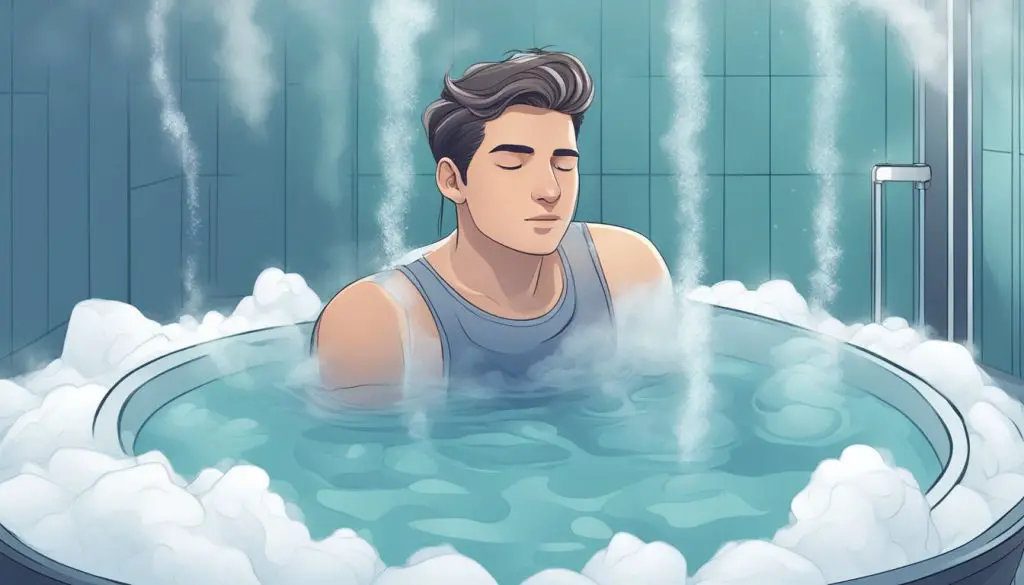Are Ice Baths Good for You Mentally? Exploring the Psychological Benefits
Taking a plunge into an ice bath, I’ve often wondered about the mental effects it has beyond the obvious shock of the cold.
While traditionally linked to physical recovery, the role of ice baths in mental health is becoming an appealing area of interest.
The crisp and numbing sensation of ice-cold water that elite athletes swear by for physical recuperation may also serve as a tool for mental and emotional fortitude. Many suggest that repeated exposure to the harsh conditions of an ice bath can help improve focus, reduce stress, and alleviate anxiety by teaching the mind resilience and control.

The idea is that by deliberately subjecting ourselves to controlled stress like an ice bath, we can train our body’s stress response. As I’ve learned more about this, it seems that the potential benefits include a better mood and perhaps even enhanced recovery—not just physically but mentally as well.
It’s about conditioning the mind to cope with and recover from stress, which could lead to improved overall well-being.
Key Points
- Ice baths may help train the mind to manage stress and improve mental resilience.
- Potential mental health benefits include improved mood, reduced anxiety, and enhanced focus.
- It’s crucial to follow safety practices and understand the science behind ice baths for mental and physical health.
Table of Contents
The Science Behind Ice Baths
Engaging with ice baths integrates a complex blend of physiological reactions within my body, tied to cold exposure and the body’s adaptive responses to cold water.
Understanding Cold Exposure
When I immerse myself in cold water, my body encounters what is known as cold water immersion. The sudden drop in temperature can lead to a range of reactions.
One primary effect is a reduction in inflammation, where the cold acts to slow down the process of inflammatory response. Notably, this exposure causes my blood vessels to constrict, a process scientifically termed as vasoconstriction. This response can help reduce swelling and inflammation.
Body’s Response to Cold Water
Diving deeper, the introduction of cold water on my skin triggers my sympathetic nervous system—the system responsible for the ‘fight-or-flight’ response.
Subsequently, my heart rate may increase initially, but then the stimulation of the vagus nerve can lead to a decrease in heart rate and incite a calming effect. This immersion also promotes circulation as blood is shunted to the core to maintain my body temperature.
Additionally, cold exposure boosts the release of norepinephrine in the brain, a hormone and neurotransmitter that can elevate my mood and alertness.
Mental and Emotional Benefits
When I consider the topic of ice baths, I often turn my attention to their physical benefits, yet it’s their impact on the mind that’s equally intriguing. They appear to offer a special kind of mental and emotional refreshment that’s worth exploring, especially in the context of recovery and mental health.
Reducing Stress and Anxiety
I find that one of the most immediate effects of immersing myself in an ice bath is the potential to lower stress and anxiety.
It’s a practice that seems to command my full attention, diverting it from daily worries, thereby offering a form of mental respite.
During the ice bath, my body reacts to the cold by releasing endorphins, the natural ‘feel-good’ hormones, which can provide a sense of relief from stress.
- Endorphins: These hormones act like natural painkillers and mood elevators, diminishing my perception of stress.
- Hormonal Balance: The stress response, involving hormones like cortisol, may become more balanced with regular ice baths.
Enhancing Mood and Resilience
Another aspect I’ve noticed is an improvement in my mood after an ice bath. The experience itself can be intense, but upon completion, I often feel a wave of accomplishment and increased mental toughness.
This regular practice could even chip away at the layers of daily emotional fatigue and contribute to better sleep, an indirect but powerful enhancer of mood and mental health.
- Mood Enhancement: Post-bath, the endorphin surge contributes to feelings of euphoria or what some might call a ‘natural high’.
- Sleep Quality: By potentially improving my sleep cycle, ice baths can support my emotional health and combat feelings of depression.
Physical Health Implications

In exploring how ice baths may affect our physical health, I’ll specifically look into their effects on muscle soreness and recovery, and their influence on various health conditions.
Effects on Muscle Soreness and Recovery
I’ve found that taking an ice bath can help reduce muscle soreness after intense physical activity. The cold temperature is believed to constrict blood vessels and decrease metabolic activity, which reduces swelling and tissue breakdown.
Once I get out of the bath and the tissue warms up, the underlying tissues warm up causing a return of faster blood flow. This helps return the byproducts of cellular breakdown to the lymph system for efficient recycling by the body.
- Muscle Recovery: Cold immersion may aid in quicker muscle recovery due to reduced inflammation and decreased soreness.
- Performance: Following an ice bath, I’ve noticed a more rapid return to optimal training and performance levels.
Influence on Health Conditions
The use of ice baths could potentially influence various health conditions. However, this is where I need to exercise caution, as not all benefits are universally agreed upon.
- Blood Circulation: Cold temperatures cause blood vessels to tighten, which can help reduce inflammation and edema. This can be beneficial for conditions like arthritis.
- Heart Rate and Blood Pressure: Short-term cold exposure can increase heart rate and blood pressure; I make sure ice baths are safe for me because individuals with cardiovascular conditions might be at risk.
- Metabolism and Brown Fat Activation: There is some evidence suggesting that exposure to cold can promote the activation of brown adipose tissue (BAT), which helps regulate core body temperature and metabolism by burning calories.
- Sleep Quality: Personally, I experience better sleep quality after an ice bath, likely due to the decrease in core body temperature that helps signal to my body that it’s time to rest.
- Diseases Prevention: Regarding chronic diseases, some studies suggest that repeated cold exposure through ice baths could potentially reduce the risk of developing diseases linked to chronic inflammation or high blood sugar levels.
Safety Precautions and Best Practices

When I think about ice baths and their mental health implications, it’s crucial that I stress the importance of safety first.
Managing Temperature and Duration
My approach to an ice bath begins with ensuring the water temperature is safe. I aim for the water to be cold enough to stimulate but not so cold as to cause shock or hypothermia.
The ideal temperature range is between 50-59 degrees Fahrenheit (10-15 degrees Celsius). When I’m preparing for an ice bath, I use a thermometer to check the temperature. This is critical, because it prevents me from guessing and potentially making a dangerous mistake.
As for the duration, my time in the ice bath is limited to avoid risks such as hypothermia or nerve damage. Typically, I stay in for about 10-15 minutes, but this varies depending on my tolerance.
I carefully watch the clock, because overstaying can lead to more discomfort and harm than good.
Understanding Potential Risks
I’m aware of several risks that come with undergoing ice baths.
Skin-related risks such as frostbite can occur if I expose my skin to very low temperatures for too long. Consequently, I take care not to exceed the recommended time. I also monitor my skin’s response closely to avoid any lasting damage.
Moreover, I’m cautious about the potential for hypothermia, a condition where my body temperature drops to dangerously low levels.
I know the signs of hypothermia, which include intense shivering, slurred speech, and drowsiness. If I notice any of these symptoms, I get out of the bath immediately and seek to warm myself gradually.
Other risks like swelling or infection can be exacerbated by cryotherapy chambers or ice baths. Therefore, I pay attention to any pre-existing conditions that might be negatively affected by the cold.
Finally, the mental aspect is vital as well. I ensure that my mental state is stable before immersing myself in extreme conditions, as ice baths can be mentally challenging and can induce significant discomfort if I’m unprepared.
Frequently Asked Questions
Exploring the effects of ice baths on mental health has piqued the curiosity of many. I’ll answer some of the most frequently asked questions on this subject.
How do ice baths affect mental health and stress levels?
From my understanding, ice baths can influence the body’s response to stress. The sudden exposure to cold can trigger a stress response, which might help individuals learn to better manage stress over time.
Can regularly taking ice baths improve mental toughness?
Regular exposure to the controlled stress of an ice bath may help build mental resilience. This is akin to the concept of repeated exposure leading to better pressure management, as observed in elite athletes.
What are the potential risks of ice baths for your mental wellbeing?
The shock of cold water can be intense. For some, this may lead to increased anxiety or stress, especially if they are not accustomed to cold exposure or have a pre-existing mental health condition that could be exacerbated.
Does exposure to cold water during an ice bath enhance brain function?
Some studies suggest that cold exposure can enhance certain aspects of brain function, such as clarity and alertness. However, consistent scientific studies need to confirm this as a direct effect of ice baths on cognitive abilities.
How can one mentally prepare for the challenge of an ice bath?
Mental preparation for an ice bath can include deep breathing, setting a determined mindset, and having a clear intention or goal for taking the ice bath.
It’s important to approach the experience with a calm and positive attitude.
Can ice baths have a positive impact on anxiety and panic attacks?
It’s important to note that ice baths may help some people manage stress, but they can potentially trigger anxiety or panic in others. The cold shock can be overwhelming.
Therefore, they should be approached with caution, especially if one is prone to anxiety or panic attacks.







